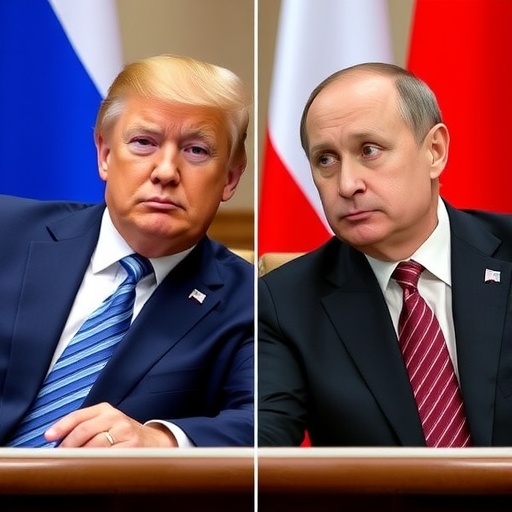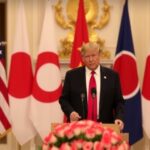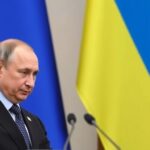Trump Cancels Putin Summit Over Ukraine Peace Deal Stalemate: A Diplomatic Blow to Global Tensions
In a stunning turn of events that has sent shockwaves through international diplomacy, President Donald Trump has abruptly canceled a highly anticipated summit with Russian President Vladimir Putin, citing an insurmountable stalemate in the Ukraine peace deal negotiations. The planned meeting in Budapest, which was set to address the ongoing conflict in Ukraine, is now off the table until both sides show genuine progress toward a viable resolution. Trump‘s decision underscores the deepening divide between Russia and Ukraine, with the U.S. leader emphasizing that without a clear path to peace, any talks with Putin would be futile.
This move comes at a critical juncture in the Ukraine crisis, which has raged for over two years, claiming thousands of lives and displacing millions. Trump, known for his unpredictable foreign policy style, stated in a White House briefing, “I’m not flying to Budapest to sip tea and chat about the weather. We need a real Ukraine peace deal on the table, or there’s no summit with Putin.” The cancellation highlights the persistent challenges in brokering peace amid Russia’s territorial ambitions and Ukraine’s unyielding defense of its sovereignty.
Trump’s Firm Stance Shatters Hopes for Budapest Breakthrough
President Trump’s cancellation of the Putin summit marks a pivotal shift in U.S. strategy toward the Ukraine conflict. Scheduled for next month in the historic city of Budapest, the meeting was envisioned as a potential turning point, where Trump and Putin could hash out details of a Ukraine peace deal. However, sources close to the administration reveal that intelligence reports indicated no substantial concessions from either Moscow or Kyiv, prompting Trump’s decisive action.
Trump’s history with Putin has been a mix of admiration and confrontation. During his first term, the two leaders met multiple times, including at the 2018 Helsinki summit, where Trump faced criticism for appearing too conciliatory. This time, however, the tone is markedly different. In a series of tweets posted shortly after the announcement, Trump wrote, “Putin and I could make a great deal for Ukraine, but not while Russia stalls and Ukraine digs in. No peace deal, no summit. Simple as that.”
The decision has immediate implications for U.S. foreign aid to Ukraine, which has topped $50 billion since the invasion began in February 2022. According to the Kiel Institute for the World Economy, the U.S. has provided more military and financial support to Ukraine than any other nation, including advanced systems like HIMARS rockets and Patriot missiles. Trump’s cancellation signals a potential reevaluation of this commitment, tying future aid packages directly to progress in peace talks.
Diplomatic insiders note that the Budapest venue was chosen symbolically, evoking the 1956 Hungarian Revolution and the city’s role in Cold War-era negotiations. Yet, with the summit scrapped, that symbolism now feels hollow. European allies, who had hoped for U.S.-led mediation, are left scrambling to fill the void.
Ukraine Peace Deal Deadlock: Russia’s Demands vs. Kyiv’s Red Lines
At the heart of the canceled summit lies the intractable Ukraine peace deal impasse. Russia’s full-scale invasion of Ukraine in 2022 has led to a brutal war, with Moscow controlling approximately 18% of Ukrainian territory, including Crimea and parts of Donetsk and Luhansk regions, as per recent assessments from the Institute for the Study of War.
Putin’s preconditions for any Ukraine peace deal remain firm: recognition of annexed territories, Ukraine’s permanent neutrality (foregoing NATO membership), and demilitarization of its armed forces. Ukrainian President Volodymyr Zelenskyy, on the other hand, insists on the full withdrawal of Russian troops, restoration of pre-2014 borders, reparations for war damages estimated at over $400 billion by the World Bank, and security guarantees from the West.
Recent negotiation rounds in Istanbul and Geneva have yielded little progress. A Ukrainian negotiator, speaking anonymously, told reporters, “The gap is wider than the Dnieper River. Russia wants capitulation disguised as peace, while we fight for survival.” Statistics from the United Nations paint a grim picture: over 10,000 civilians killed, 18 million in need of humanitarian aid, and infrastructure destruction costing tens of billions.
Trump’s intervention was meant to bridge this divide, leveraging his self-proclaimed deal-making prowess. Yet, the stalemate persists, exacerbated by domestic politics in both the U.S. and Russia. In the U.S., Republican hawks push for tougher sanctions on Putin, while some isolationists question endless Ukraine funding. In Russia, state media portrays any concession as weakness, bolstering Putin’s hardline image ahead of his 2024 re-election.
To illustrate the deadlock, consider the Black Sea grain deal, a rare point of cooperation that allowed Ukrainian exports amid the war. Collapsed in July 2023 due to Russian demands, it led to global food price spikes affecting 400 million people, according to the Food and Agriculture Organization. Reviving such initiatives could be a stepping stone to a broader Ukraine peace deal, but trust remains shattered.
Putin’s calculated Response Signals Escalation Risks
Vladimir Putin’s reaction to the canceled Trump-Putin summit has been characteristically measured yet ominous. In a Kremlin statement, Putin remarked, “President Trump understands the realities on the ground in Ukraine. If the U.S. chooses to prolong the conflict, Russia will defend its interests accordingly.” This veiled warning comes as Russian forces report advances in the eastern Donbas region, capturing key villages and intensifying artillery barrages.
Putin’s strategy appears to be one of attrition, betting that Western support for Ukraine will wane. Russian military spending has surged to 6% of GDP, funding a war machine that includes hypersonic missiles and drone swarms. Analysts from the RAND Corporation warn that without a Ukraine peace deal, Putin could escalate hybrid warfare, including cyberattacks on NATO infrastructure.
The personal dynamic between Trump and Putin adds intrigue. Trump has often praised Putin’s strength, once calling him a “genius” for the Ukraine invasion. Putin, in turn, has expressed willingness for direct talks, but only on Russia’s terms. The canceled summit deprives them of a face-to-face venue, potentially pushing communications to backchannels or public posturing.
Internationally, Putin’s allies like China and Iran have ramped up support. Beijing has increased trade with Moscow to offset sanctions, while Tehran supplies Shahed drones used in Ukrainian strikes. This axis of convenience complicates any path to a Ukraine peace deal, as external powers stake their geopolitical claims.
- Russian Territorial Gains: Over 100,000 square kilometers under control, per satellite imagery from Maxar Technologies.
- Sanctions Impact: Russia’s economy grew 3.6% in 2023 despite Western measures, driven by oil exports to India and China.
- Military Casualties: Estimates suggest 300,000 Russian troops killed or wounded, fueling domestic unrest.
Global Allies React with Concern to Summit Fallout
The cancellation of the Trump-Putin summit has elicited a spectrum of responses from global leaders, many expressing alarm over the stalled Ukraine peace deal. NATO Secretary General Jens Stoltenberg urged continued unity, stating, “The alliance stands firmly with Ukraine; diplomacy must not falter because of one meeting.”
In Europe, German Chancellor Olaf Scholz called the move “disappointing but understandable,” pledging an additional €5 billion in aid to Kyiv. French President Emmanuel Macron, a proponent of engaging Putin, warned of “escalation risks” without U.S. involvement. Meanwhile, the UK, under Prime Minister Rishi Sunak, criticized the decision as premature, with Foreign Secretary David Cameron tweeting, “Peace in Ukraine requires bold talks, not boycotts.”
Further afield, the implications ripple to the Middle East and Asia. Israel’s Prime Minister Benjamin Netanyahu, navigating his own conflicts, expressed hope for U.S.-Russia de-escalation to stabilize global energy markets. In Asia, Japan’s support for Ukraine sanctions on Russia underscores fears of territorial aggression echoing its own disputes with Moscow over the Kuril Islands.
Civil society reactions are equally fervent. Ukrainian diaspora groups in the U.S. rallied in Washington, chanting “No peace without justice.” Human rights organizations like Amnesty International highlighted the humanitarian toll, with over 6 million Ukrainian refugees straining European resources.
Economically, the news exacerbated market jitters. Oil prices spiked 2% to $85 per barrel, reflecting fears of prolonged Ukraine instability. The World Trade Organization forecasts a 1.5% drag on global GDP if the war persists into 2025.
Path Forward: Rebuilding Momentum for Ukraine Resolution
As the dust settles from the canceled summit, attention turns to potential next steps in the quest for a Ukraine peace deal. Trump has indicated openness to alternative formats, such as virtual talks or multilateral forums under the UN banner. Advisors suggest leveraging the G20 summit in Brazil later this year as a neutral ground for Trump and Putin to reconnect.
For Ukraine, bolstering defenses remains paramount. Zelenskyy’s administration is pushing for F-16 fighter jets from NATO allies, with deliveries expected by mid-2024. U.S. congressional leaders, including Senate Foreign Relations Committee Chair Ben Cardin, advocate for a bipartisan resolution tying aid to negotiation benchmarks.
Russia, facing internal pressures from war fatigue and sanctions, may seek concessions to ease economic strain. Putin’s inner circle has floated ideas like a ceasefire along current lines, though Kyiv rejects this as a frozen conflict. International mediators, including Turkey’s President Recep Tayyip Erdogan, who brokered the grain deal, are positioning themselves as key players.
Looking ahead, experts predict that a breakthrough Ukraine peace deal could hinge on U.S. elections in 2024. If Trump secures a second term, his transactional approach might yield results; a Democratic victory could emphasize multilateralism. In the interim, humanitarian corridors and demining efforts offer glimmers of hope amid the stalemate.
The canceled summit with Putin serves as a stark reminder of the fragility of diplomacy in the Ukraine crisis. As Trump refocuses on domestic priorities, the world watches warily, hoping for a thaw that could end the suffering and reshape global security.
(Word count: 1,652)








